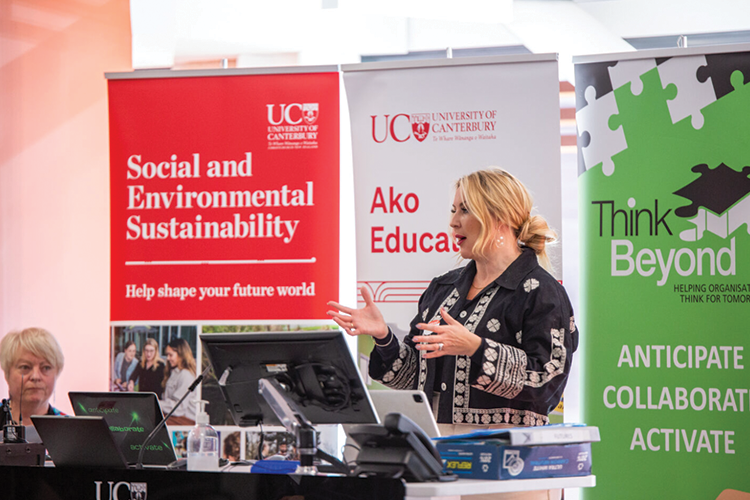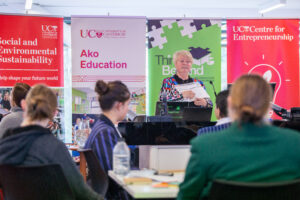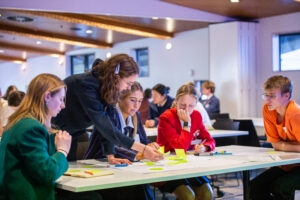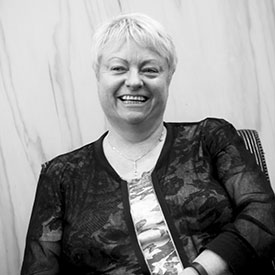
August 1st, 2023
Keeping Future Generations in Mind
“What do you want to leave behind for your children, grandchildren and generations to come?”

I hosted Sophie during her recent visit to Aotearoa New Zealand and followed her as she spoke to community groups, iwi, health, youth, education and local government. All were eager to learn from the Welsh journey and to work together to create a visionary future for our country. The Productivity Commission and other groups have suggested that we need similar legislation and a Commissioner for Future Generations here. This would help us all look to the horizon – to do the work of today but also connect with the future.
Connecting with the future requires new ways of thinking at both personal and professional levels. Developing our personal futures understanding starts with exploring the intertwined nature of past, present and future and the impact of our own values and worldviews on the world around us. This personal awareness helps us consider the ways in which we use the future today and the impact on future generations.
Every organisation can also take a more futures focused view. This isn’t about exploring a few trends and adding them to a strategic plan, that is simply futureswashing. If we are serious about meeting the needs of future generations we can begin by:
- understanding that there are multiple futures unfolding
- scanning for signals of change and connecting dots
- bringing diverse teams together to learn the skills of futures thinking
- asking what if, not what next
- working towards a preferred future while still being agile and adaptive
Sophie’s visit reinforced the importance of developing futures literacy in individuals and teams. There is also huge potential for organisations to pay attention to the way in which they help or hamper intergenerational fairness. And young people need to be at the table. If you are interested in finding out more about this contact me, Cheryl, for a conversation.

Read here about a Youth Futures workshop held during Sophie’s visit, a collaboration between Think Beyond, Grow Waitaha and the University of Canterbury
Ngā mihi,
Dr Cheryl Doig · Kai titiro wāheke – Futurist
Leadership Lab and Think Beyond
#futuresaunty
Ko ngā tāhū ā o tapu wai inanahi hei tauira ora mō āpōpō .
The footsteps laid down by our ancestors create the paving stones upon which we stand today.
Photo credits: Erica Austin, Peanut Productions
You can also connect with stories of impact from across our Leadership Lab ecosystem by signing up for this monthly pānui (see bottom of www.leadershiplab.co.nz ), joining our Leadership Lab LinkedIn page and browsing our website. Thanks heaps for your interest.

August 1st, 2023
Keeping Future Generations in Mind
“What do you want to leave behind for your children, grandchildren and generations to come?”

I hosted Sophie during her recent visit to Aotearoa New Zealand and followed her as she spoke to community groups, iwi, health, youth, education and local government. All were eager to learn from the Welsh journey and to work together to create a visionary future for our country. The Productivity Commission and other groups have suggested that we need similar legislation and a Commissioner for Future Generations here. This would help us all look to the horizon – to do the work of today but also connect with the future.
Connecting with the future requires new ways of thinking at both personal and professional levels. Developing our personal futures understanding starts with exploring the intertwined nature of past, present and future and the impact of our own values and worldviews on the world around us. This personal awareness helps us consider the ways in which we use the future today and the impact on future generations.
Every organisation can also take a more futures focused view. This isn’t about exploring a few trends and adding them to a strategic plan, that is simply futureswashing. If we are serious about meeting the needs of future generations we can begin by:
- understanding that there are multiple futures unfolding
- scanning for signals of change and connecting dots
- bringing diverse teams together to learn the skills of futures thinking
- asking what if, not what next
- working towards a preferred future while still being agile and adaptive
Sophie’s visit reinforced the importance of developing futures literacy in individuals and teams. There is also huge potential for organisations to pay attention to the way in which they help or hamper intergenerational fairness. And young people need to be at the table. If you are interested in finding out more about this contact me, Cheryl, for a conversation.

Read here about a Youth Futures workshop held during Sophie’s visit, a collaboration between Think Beyond, Grow Waitaha and the University of Canterbury
Ngā mihi,
Dr Cheryl Doig · Kai titiro wāheke – Futurist
Leadership Lab and Think Beyond
#futuresaunty
Ko ngā tāhū ā o tapu wai inanahi hei tauira ora mō āpōpō .
The footsteps laid down by our ancestors create the paving stones upon which we stand today.
Photo credits: Erica Austin, Peanut Productions
You can also connect with stories of impact from across our Leadership Lab ecosystem by signing up for this monthly pānui (see bottom of www.leadershiplab.co.nz ), joining our Leadership Lab LinkedIn page and browsing our website. Thanks heaps for your interest.


